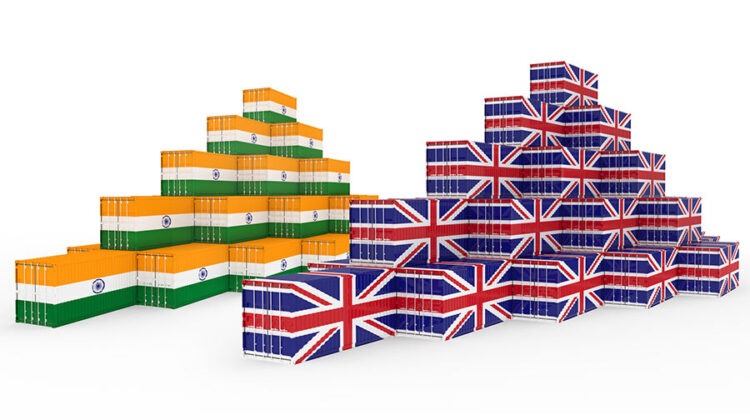
India, UK Agree to Immediate ‘Enhanced Trade Partnership’
Agreement to fast-track free trade and market access
Full free trade agreement could be in place by June
An interim deal could be agreed with immediate effect
UK exporters should be assessing the India market
The British Foreign Secretary Liz Truss, and Shri Piyush Goyal, India’s Minister for Commerce and Industry released a joint statement today laying the groundwork for an ‘Enhanced Trade Partnership’ (ETP) following meetings held this past weekend in Delhi.
The UK and India have been examining the potential for a full Free Trade Agreement, and discussions were carried out on the entire range of bilateral trade and economic relations, while understanding each other’s priorities and trade sensitivities. Both Trade Ministers reiterated their commitment to long term India-UK partnership and agreed to deepen trade cooperation between the two countries through an ETP. They also reviewed progress in removing market access barriers on both sides.
The British Foreign Secretary, Liz Truss, with Shri Piyush Goyal
Interim Agreement likely before a new FTA
The India and UK Trade Ministers reviewed the ongoing engagements between the two sides for an ETP as part of developing a roadmap towards a potential comprehensive FTA, including considerations on an interim agreement on preferential basis.
UK Prime Minister Johnson to visit India
This revamped partnership would formally be launched during the visit of the UK Prime Minister to India, planned for later this year. That is expected to happen in Q2, probably late May, prior to Indian Prime Minister Narendra Modi’s own planned visit to the UK to attend the G7 meetings in June. Both UK and Indian Ministers have committed themselves to making concrete progress on the trade and investment front to deliver quick gains for both countries, including joint timelines for further advances. A sense of urgency was underlined to accelerate the process towards launching the ETP, with commitments to interact and identify fast bilateral deliverables that would cement an agreement and immediately come into service.
Background
For the UK, a prospective trade deal with India would be an opportunity to foster a post-Brexit and post-COVID economic recovery, by enabling British commerce with broader and greater access to India’s fast expanding consumer market of 1.3 billion and its significantly growing middle class, at a time when the prospects for global growth after the pandemic still remain uncertain.
The 14th UK – India Joint Economic and Trade Committee (JETCO) meeting on 28 July, 2020, agreed to prioritize five key areas: life sciences, information communications technology (ICT), food and drink, chemicals, and services to address non-tariff barriers to trade – to first, secure an enhanced trading arrangement, followed eventually by a free trade agreement. The UK is the second fastest growing G20 investor in India over the last 10 years.
India is currently the UK’s sixth largest non-EU trading partner after the US, China, Japan, Switzerland, and Norway. Bilateral trade in goods and services, in 2019, was around US$15.7 billion and US$18.9 billion, respectively, and are gaining economic importance in both countries. Although India enjoys a trade surplus with the UK, the latter’s exports to India have being growing steadily. The fastest expansion was in services, which experienced annual rises of seven percent over the last seven years.
Britain has been the second fastest growing G20 investor in India, since 2010. UK companies have been developing a fast expanding market share across a number of key Indian domestic sectors, such as food and beverages. This has arisen in the face of India’s relatively high import tariffs and various non tariff barriers. However, UK brands, such as Scotch whisky, have sold well in the Indian market and continue to grow in strength, making India that UK brand’s third largest market internationally.
Britain’s business opportunities in India will improve as India continues to liberalize its foreign direct investment (FDI) policy, including raising the maximum shareholdings that foreign investors can have in insurance companies from 49 percent to 74 percent. Additionally, other major sectors that could benefit from UK investment and expertise include healthcare and agricultural development. Other UK giants, such as Johnson Matthey, Ricardo plc, and GKN, are also in India.
In the meantime, India is one of the largest foreign direct investors in the UK, holding second place behind the US and accounting for over half a million jobs in the UK. Indian conglomerates, such as Tata Steel, have been major high profile investors in the country and report in the region of up to £40 billion in turnover a year. Beyond heavy industry sectors, such as automotive and steel, India investors have been long-term players in a range of other industries, including IT services, logistics, facilities management, and business contact centers.
When the UK’s Foreign Minister, Dominic Raab, paid a visit to India at the end of 2020, he proposed a 10-year partnership in the form of a comprehensive strategic partnership, and building on the earlier strategic partnership of 2004. However, the new proposed ties cover a broader range of collaborative measures, including closer military cooperation across the Indo-Pacific region amid other areas of co-development, such as tackling climate change and countering international terrorism.
For the UK, the strengthening relationship with India promotes the government’s “Global Britain” strategy of building more expansive relations in the Asia Pacific region, including with its recent application to join the Comprehensive and Progressive Agreement for Transpacific Partnership (CPTPP) free-trade bloc and last month’s FTA deals with Singapore, and Vietnam.
